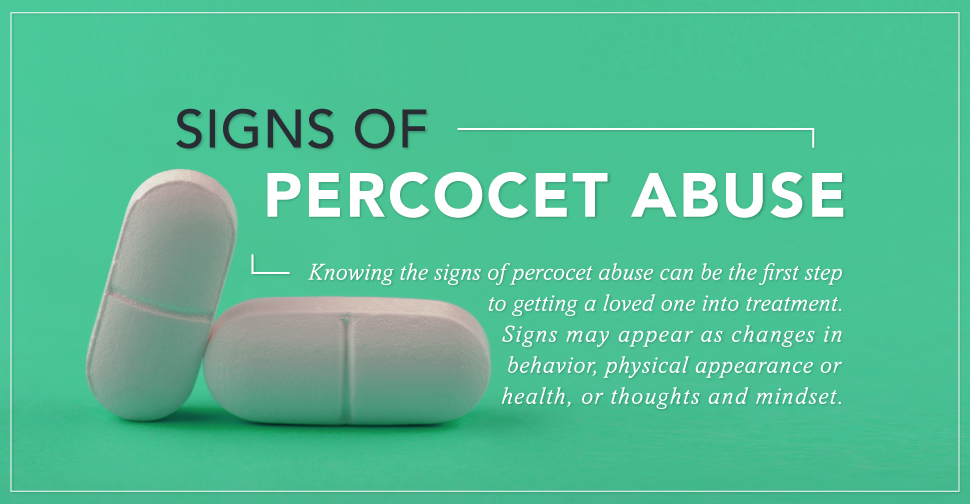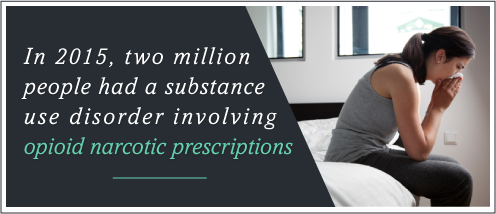
Percocet is a combination opioid narcotic—a pain-relieving prescription medication. Many opioid prescription drugs have highly addictive properties, presenting great risk of abuse to those who take them. The opioid epidemic looms large in the United States. In 2015, two million people had a substance use disorder involving opioid narcotic prescriptions. This number includes adolescents age 12 and older, and accounts for nearly ten percent of all substance abuse, according to the American Society of Addiction Medicine (ASAM).

The best way to fight this growing trend is to help addicted individuals get into treatment, and raise awareness about the risks associated with prescription opioids like percocet. DrugRehab.org can assist you in finding resources for treatment.
Not everyone understands the dangers of abusing prescription drugs. In fact, many people never question a medication’s potential for abuse simply because it is prescribed by a physician. Yet abuse of opioids has increased in the past few decades, resulting in alarmingly high rates of overdose deaths.
When people enter treatment, they can learn to manage their addiction, and eventually abstain from use of substances altogether. Behavioral therapy remains the most effective form of treatment for opioid addiction as it teaches addicted individuals to focus on a substance-free lifestyle. Rebuilding life outside of substance abuse is key to successful recovery.
What Is Percocet?
Percocet belongs to a group of opioid narcotics known as combination medications. It is comprised of the narcotic pain reliever, oxycodone, and the non-opioid pain reliever, acetaminophen. The medication works by changing the way a person’s brain responds to the pain (oxycodone) and also by relieving pain and reducing fever (acetaminophen). It is available in tablet or liquid form, and dosage depends on a person’s medical needs.

What Are The Signs Of Percocet Abuse?
Knowing the signs of percocet abuse can be the first step to getting a loved one into treatment. Signs may appear as changes in behavior, physical appearance or health, or thoughts and mindset. The following are signs of opioid abuse, according to the American Academy of Family Physicians:
- Agitation
- Anxiety/panic attacks
- Breathing changes (slowed or shallow)
- Constipation
- Depression
- Drowsiness
- Irritability
- Lack of coordination
- Lack of interest in hobbies or daily activities
- Lowered or lack of motivation
- Making bad decisions/lack of inhibitions
- Mood changes
- Poor performance in school, work, or other obligations
- Slurred speech
- Sleep changes (sleeping a lot or insomnia)
What Are The Side Effects Of Percocet Abuse?
Perhaps the most dangerous side effect of percocet abuse is the risk of physical dependence. Percocet, like many opioids, is prescribed only for a short period of time—because it is highly addictive. Even if taken as directed, a person can develop tolerance to the effects of the medication. This means that a person no longer feels the effects when taking it. As a result, a person may begin taking higher or more frequent doses to achieve the same euphoric effects (the “high”).
Within a short time, when a person’s body and brain become accustomed to the effects of the drug, that person may experience withdrawal symptoms when not taking it, or when trying to stop taking it. Withdrawal can be harsh, resulting in such symptoms as:
- Extreme fatigue
- Depression
- Diarrhea
- Insomnia
- Nausea and/or vomiting
- Pain
- Tremors
In extreme cases, opioid abuse can be fatal. As a person becomes tolerant, he or she may begin taking higher or more frequent doses, increasing the risk of overdose. To avoid this outcome, it is best to seek treatment for prescription drug abuse right away, and we at DrugRehab.org can help with this.
Who Is Affected By Opioid Addiction?
Of the millions of Americans affected by opioid addiction, the ASAM explains, “women are more likely to have chronic pain, be prescribed prescription pain relievers, be given higher doses, and use them for longer periods than men.” Prescription opioid abuse is particularly common among youth, who often obtain unused or unsecured medications from a relative.

But one of the most far-reaching effects of prescription opioid addiction is that it can lead to abuse of other recreational drugs. For example, four out of five people newly abusing heroin began first abusing prescription drugs. With such a vast scope, and excessive numbers of overdose deaths, opioid addiction has become an epidemic. Treatment in an inpatient rehab center is the best recourse for those struggling.
How To Help Someone With Addiction
Addiction to prescription opioids such as percocet can have dire consequences to a person’s health and life. Long-term use can also increase a person’s chances of developing addiction to other illicit drugs, or suffering overdose. Help your loved one find appropriate treatment before it’s too late. Contact us today at DrugRehab.org to learn more about rehab centers and treatment options.
For More Information Related to “Signs Of Percocet Abuse” Be Sure To Check Out These Additional Resources From DrugRehab.org:
- How Prescription Opiates Can Lead To A Heroin Addiction
- The 45 Warning Signs Of Prescription Drug Abuse
- Prescription Drug Abuse Prevention Plan
- How To Stop Prescription Drug Abuse
- Prescription Drug Overdose Symptoms
- Prescription Drug Abuse: An American Epidemic
Sources
American Academy Of Family Physicians—Opioid Addiction
American Society Of Addiction Medicine—Opioid Addiction 2016 Facts And Figures
U.S. Department Of Health And Human Services—The U.S. Opioid Epidemic
WebMD—Percocet


